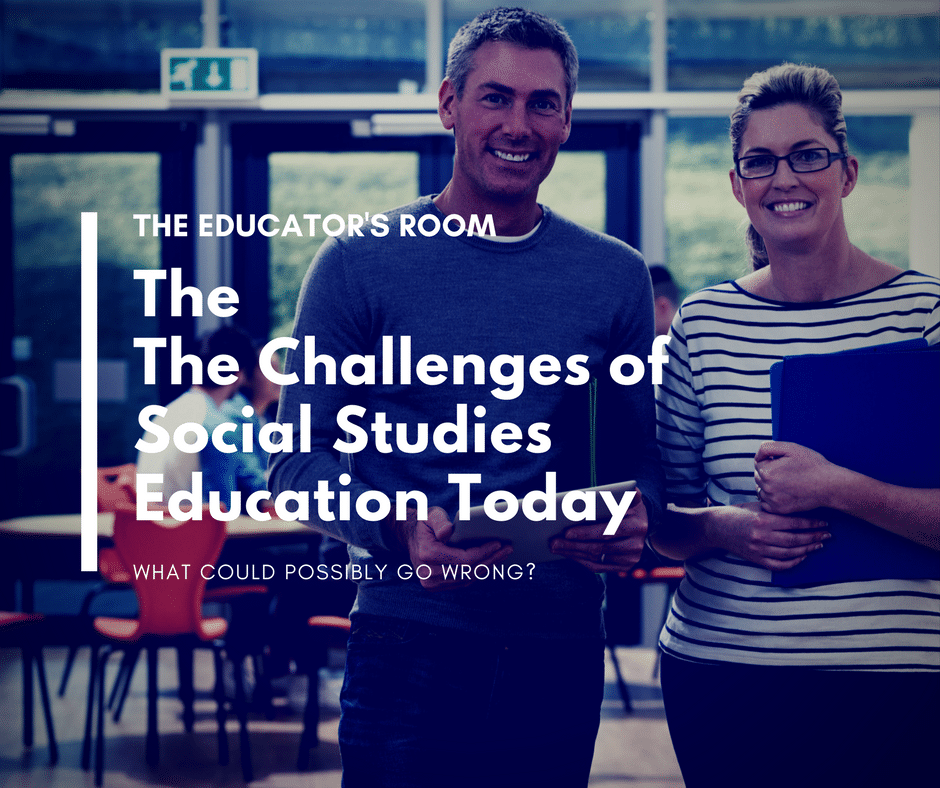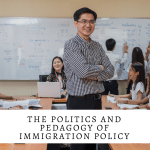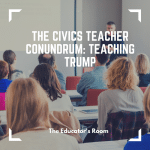Have you signed up for The Educator’s Room Daily Newsletter? Click here and support independent journalism!
One educator’s perspective
Next school year, I will “celebrate” my thirty-fifth year in secondary social studies education. I have taught at both middle and high school levels, predominantly in US History and US Government. My current assignment involves 7th grade US History (1865 to the present), 8th-grade Civics, and 10th Grade World History (Renaissance to the present) in a Virtual High School setting online. Why do I love teaching about the past and the present? I want to help young people recognize the importance of knowing the past to make a better future. My parents survived the Nazi Holocaust in World War II and emigrated from the Netherlands in the 1950s.
It is their story and their message of understanding that acts as the foundation for every lesson I teach both academically in the classroom and through social relationships found in extra-curricular activities and my own political activism. My own involvement in party politics is my way of “living the lesson plan” that I impart to my students and now to my own three grown adult children. I must have done something right: my son graduated with a degree in political science and is now forging his own career in political activism. My youngest daughter hopes to embark on a career in social work. My eldest daughter frequently attends political marches and rallies with me. I am proud of their activism. These lessons are critical for the maintenance of a vibrant, pluralistic, and lasting democracy, established by our Founding Fathers through the ideals of the Declaration of Independence and the Constitution, carried out with hope of providing, as the Preamble to the Constitution states, “the blessings of liberty to ourselves and our posterity.”
Striving for Objectivity
Even though I vote in every election, participate in campaigns, donate what little I can to candidates with whom I agree, and share my experiences through social media, my students must be shielded from these activities lest they ascertain my party affiliation or the political ideology to which I ascribe. In my district, school employees may not engage in any political activity within the classroom or within the walls of any school facility during school hours.
And rightly so. As educators, we assert a powerful influence over the cognitive and moral development of our students. This fact is especially true in middle school where students arrive to class with opinions predominantly formed by parental influence. Middle school students are on the verge of formal thought and of arriving independently at their own conclusions about the world. Parents want to be the primary factor in the development of their children’s moral, ethical, and political outlook. Adults working within education should not be pressured to defend their political affiliation, through discussion of current events, party politics, and the moral basis of political ideology are often subjects for debate within the faculty workroom.
I wish I had a dollar for each instance where someone said to me, “you have a tough job” when I tell them I teach middle school social studies. The job has become especially challenging during and after the 2016 election cycle. As human beings, we educators have our own opinions on the candidates, on the elected officials of our government, and on the policies established at all levels of government, federal, state, and local. As educators, these opinions must be hidden, repressed, and omitted from the lessons delivered in the classroom. Any expression of partisanship is not only a violation of school board policy but opens one up to criticism from the school’s most important stakeholders after the students, their parents. This veneer of objectivity requires the teacher to become an actor half of the time, to be passionate not only about the viewpoints they wish to impart but also about the viewpoints with which they disagree.
There is one ideology over which I will not compromise: the one that requires every human being to accept another human being without regard to race, religion, ethnicity, and dare I say it, sexual orientation or gender status. The last class of people I mentioned there, though, cannot be mentioned in the middle school classroom because the sensibilities of certain parents may be offended. This omission feels like censorship and discrimination with which public education is only now starting to deal in an honest and open manner.
No classroom is an island
I have already indicated the importance of parents as stakeholders in the education of their children. But their children are not growing up in isolation from the powerful forces of our society. And the secondary social studies classroom is especially vulnerable to the influences of the outside world. Students in middle and high school should be encouraged to pay attention to current events so they can make connections between past and present. Still, they must be taught to evaluate their news sources so they can detect bias, verify the veracity of the source and the accuracy of its content, and they must be able to make moral judgments about whether a social phenomenon is good or bad.
The challenge here is that many news sources today are biased toward one end of the political spectrum or another. In fact, the entire news business has been accused of having a liberal bias. Part of a living and breathing democracy, though, is the existence of a free press that acts as a watchdog against the abuses of a potentially tyrannical government. Indeed, some lawmakers have accused K-12 education as coming from a liberal perspective, in part because public education itself is a government service and therefore depends on taxation and government spending to survive, two elements of liberal politics according to the Right. Modern journalism and social studies education have a common challenge: how to be truth-tellers without being accused of bias in the age of social media and “fake news.”
Who gets to write the curriculum?
Social studies education today is experiencing a tug-of-war over what is appropriate for a child’s young mind to consume. In some states, the question of why the Civil War was fought is undergoing revision, with the abolition of slavery taking a back seat to the exertion of states’ rights.
In the wake of the violent Charlottesville protests and the emergence of the “alt-right,” teachers are increasingly pressured to ignore the history of racism in America. When teachers are brave enough to teach time-honored democratic ideals such as equality for all Americans under the 14th Amendment or the end of legal discrimination and segregation through the Civil Rights Act of 1964, they are accused by some parents of teaching Civics and History with a “liberal bias.”
In this age of extreme political polarization, parents have become more vocal over content to which they object. In fact, topics such as abortion, sexual orientation, and gender identity are still off limits in the middle school classroom, in part because some students have not been exposed to these issues or parents have not taken the opportunity to clarify those issues with their children.
Conclusions
Social studies educators are confronted with a moral dilemma that is a lose-lose situation for themselves and for their students. Can they be free enough to have what is called in multicultural education as “the courageous conversation” with their students and their colleagues without incurring the wrath of parents and administrators? It seems that the willingness of some teachers to hold up a mirror reflecting the challenges of American history and society today is too much for some involved in education to take.
These challenges involve being truthful about issues of race, tolerance, and acceptance as they project themselves through both the history textbook and the multitude of screens that now pervade our society. Students want to know the truth and it is incumbent on us educators to be brave enough to share it with them. When I pointed out that Native Americans were forced onto reservations and required to assimilate into the dominant white culture, one of my 7th graders innocently opined, “that just as bad as what they did to African Americans.”
I did not shy away from the student’s point; in fact, I verbally praised him for his critical thinking and willingness to express it. Without discussing the details, I was encouraged to see that my students were willing to recognize the injustice that is often inherent in American history. I am proud to help shape their sense of moral outrage because ending prejudice is not a liberal or conservative activity. It should be part of our modern social studies curriculum.







Great piece! I especially related to:”This omission feels like censorship and discrimination with which public education is only now starting to deal in an honest and open manner.” I too believe there are universal truths.
Great Article! We, at this point in time, are struggling with 7th grade Social Studies. It is truly complex and the teaching mode is quite unclear.
I so enjoyed Social Studies, but the presentation baffles me. Having Native American Heritage, I looked forward to this year. So far it has been a major struggle at best. Is there not a Standard they go by to teach?